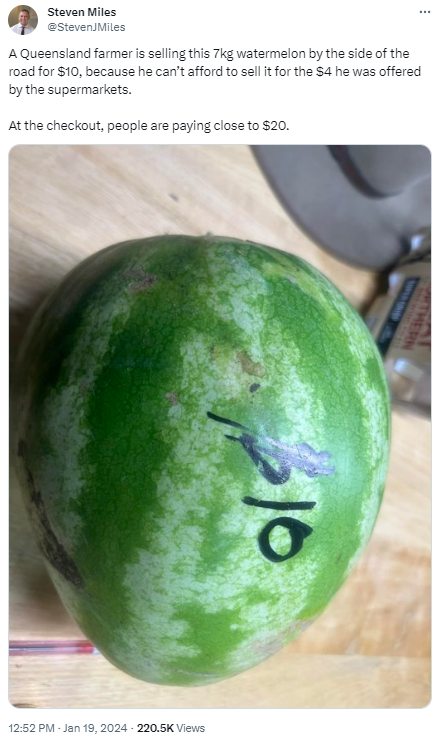
It’s a real question that many are asking when the cost of living has seemingly escalated to levels that most young people (the majority of our readers) are now struggling to find the income to study full-time. A Senate inquiry into the Cost of Living was launched last December to address the current financial pressures on Australians, where the rising cost of groceries plays a significant role.
Last month Queensland’s Premier Steven Miles announced the Queensland Parliament would be launching its parliamentary inquiry into grocery prices. “$10 watermelon that a farmer is selling by the side of the road because he can’t afford to sell it for the $4 that he was offered by a supermarket.” said the Queensland Premier.

“It’s a seven kilogram watermelon and they’re selling it for $5.50 a kilo in their stores.”
A spokesperson from Woolworths claimed farmers are paid the market price for their produce, but this price “can be affected by weather and seasonality”, as reported by Channel 9 news last year. However, these claims are now being scrutinised in the most recent Inquiry into price gouging and unfair pricing practices Final Report commissioned by the Australian Council of Trade Unions (ACTU) and chaired by Professor Alan Fels AO,
It’s an 80-page report, but the short version is the report found that the cause of inflation was a result of “weak and ineffective competition in too many sectors of the economy”, said Fels. The other issue is that Australia’s price regulator, the Australian Competition & Consumer Commission (ACCC) has limited powers to intervene in high prices as long as this is achieved without collusion between firms.
In Australia, the grocery retail sector is a duopoly between Coles-Woolworths, and you can imagine all it takes is for one of the two supermarkets to raise their prices and the other to follow suit to effectively raise the price for everyone. Repeat this a few more times, and you’ll have watermelons being sold at $38 in all supermarkets across the country. No collusion required.
Effectively, this is what has happened for a range of grocery items, and we’re the ones paying for it. Perhaps the conflict in Ukraine and seasonal shortages played a role in the short term, but prices stayed high because there simply isn’t enough competition to keep these supermarket giants honest.

So besides hating on the big corporate giants, what types of solutions could be considered? Well it’s possible that the Federal Government could look into legislating more powers to the ACCC to regulate prices even in the absence of collusion. Whilst this option would send shivers down the spines of free-market economists, it is worth considering that we already apply price regulation for certain commodities in the energy sector like coal and natural gas.
The alternative would be to break the Coles-Woolworths duopoly by introducing more supermarket competitors or somehow force both giants to break into smaller supermarket chains. Either way, price regulation is a more likely outcome than the latter much to the dismay of free-market advocates.
Views: 36

